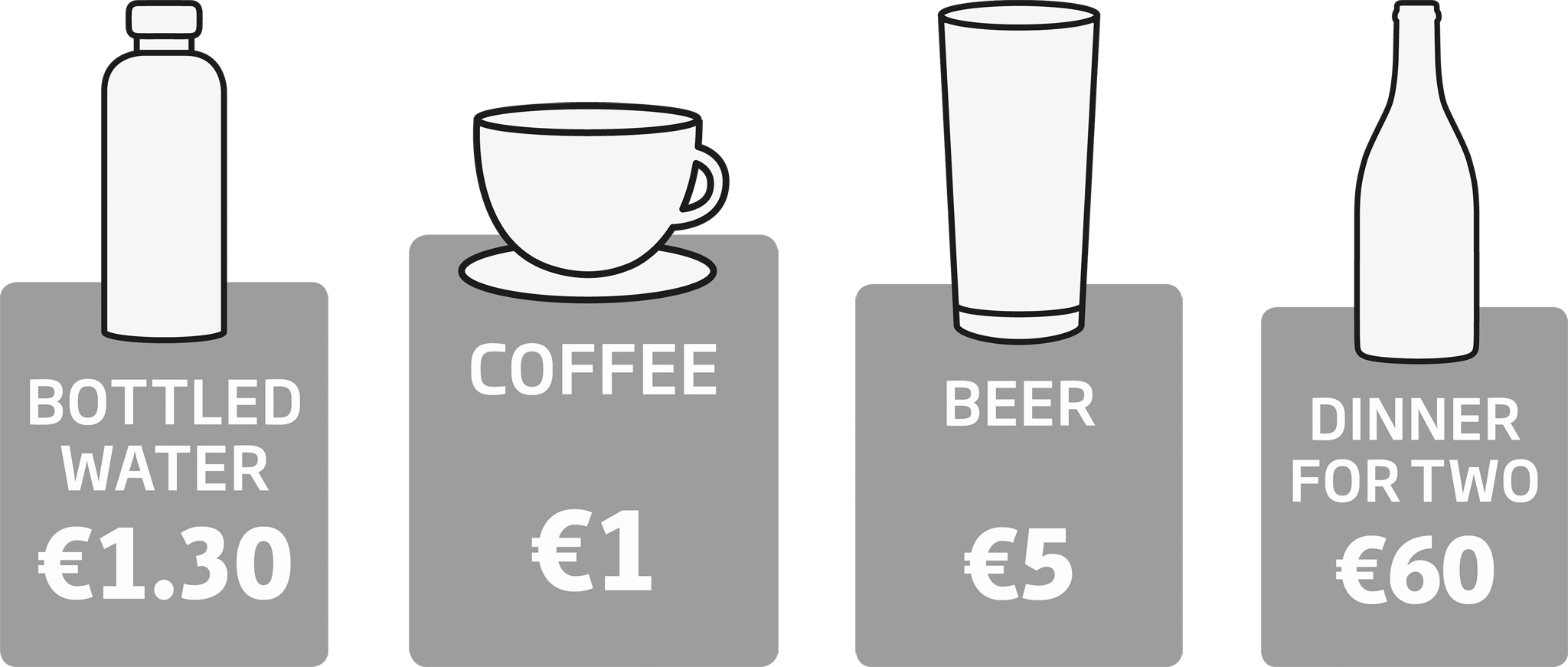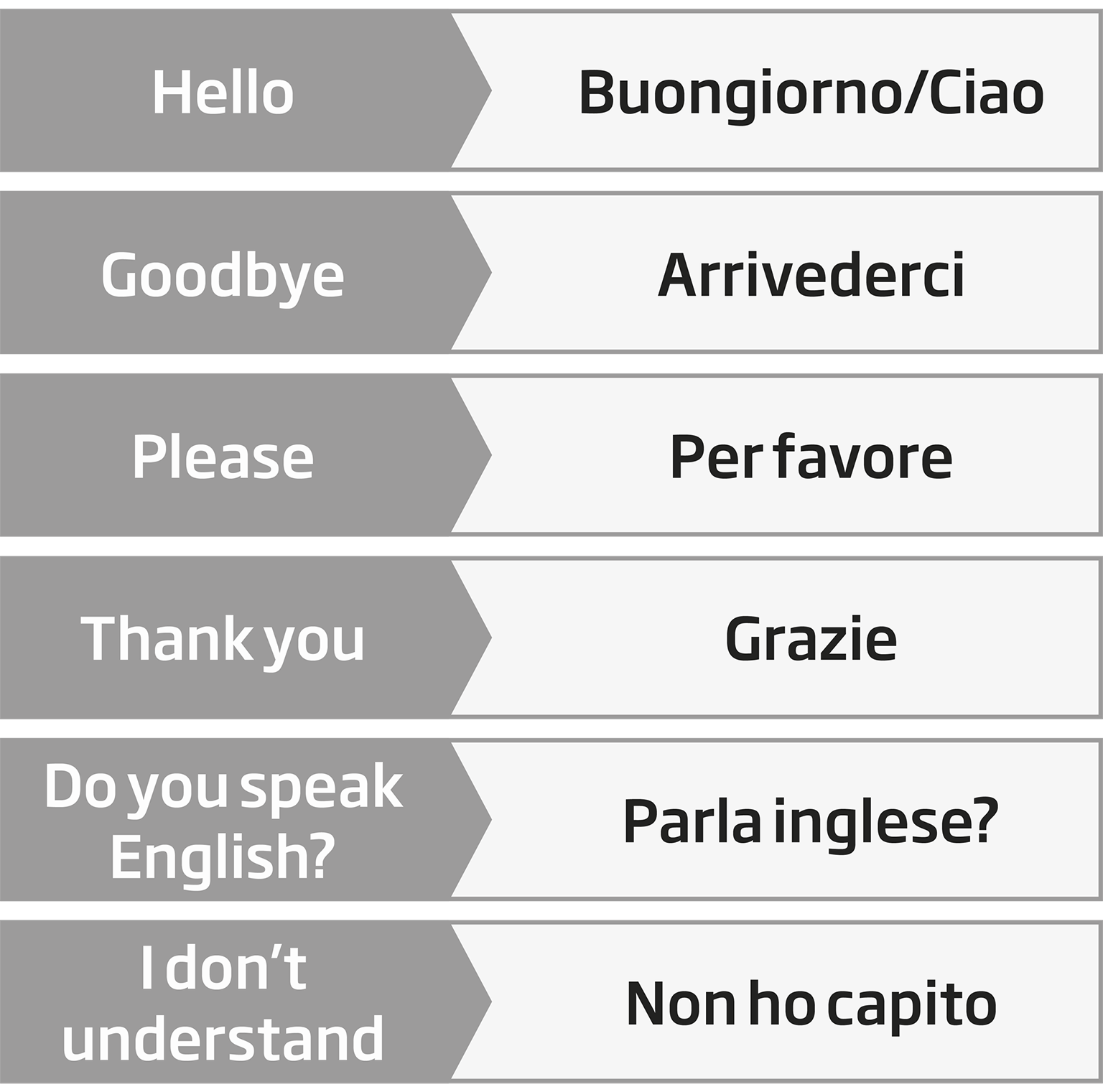At a Glance

Currency
Euro (EUR)
Average daily spend


g Need to Know g Contents
Forward planning is essential to any successful trip. Be prepared for all eventualities by considering the following points before you travel.
EU nationals and citizens of the UK, US, Canada, Australia and New Zealand do not need visas for stays of up to three months. Consult your nearest Italian embassy or check the Polizia di Stato website if you are travelling from outside these areas.
Polizia di Stato
Visitors can get up-to-date travel safety information from the UK Foreign and Commonwealth Office, the US State Department and the Australian Department of Foreign Affairs and Trade.
AUS
UK
∑ gov.uk/foreign-travel-advice
US
An individual is permitted to carry the following within the EU for personal use:
Tobacco products: 800 cigarettes, 400 cigarillos, 200 cigars or 1 kg of smoking tobacco.
Alcohol: 10 litres of alcoholic beverages above 22% strength, 20 litres of alcoholic beverages below 22% strength, 90 litres of wine (60 litres of which can be sparkling wine) and 110 litres of beer.
Cash: if you plan to enter or leave the EU with €10,000 or more in cash (or the equivalent in other currencies) you must declare it to the customs authorities.
Outside the EU limits vary, so check restrictions before departing.
It is wise to take out an insurance policy covering theft, loss of belongings, medical problems, cancellation and delays.
EU citizens are eligible for free emergency medical care in Italy provided they have a valid EHIC (European Health Insurance Card). Visitors from outside the EU must arrange their own private medical insurance.
EHIC
∑ gov.uk/european-health-insurance-card
No inoculations are needed for Italy.
Rome offers a huge variety of accommodation, comprising luxury five-star hotels, family-run B&Bs, budget hostels and private apartment rentals. A list of accommodation to suit all needs can be found on the ENIT (Italy’s national tourist board) website.
During peak season lodgings fill up and prices become inflated, so book in advance.
All accommodation adds the city tourist tax to its rates. This varies between €3 and €7 per night (depending on the hotel category) for a maximum of ten nights. Always check if the city tax is included in the rate quoted to you.
Under Italian law, hotels are required to register guests at police headquarters and issue a receipt of payment (ricevuta fiscale), which you must keep until you leave Italy.
Most establishments accept major credit, debit and prepaid currency cards. Contactless payments are becoming increasingly common in Rome, but it’s always a good idea to carry some cash for smaller items such as coffee, gelato, pizza-by-the-slice, and when visiting markets or more remote areas.
Rome’s historic towns and cobbled streets are ill-equipped for disabled access. Many buildings do not have wheelchair access or lifts. Always call ahead to ensure that your needs will be met. CO.IN. Sociale provides information and general assistance for travellers with mobility issues.
Assistance at airports can be arranged by notifying your airline company or travel agent of your particular needs in advance of your trip. ADR Assistance can coordinate assistance at Rome’s Ciampino or Fiumicino or airports. Train travellers with Trenitalia can arrange special reservations and assistance at stations.
ADR Assistance
∑ adr.it
CO.IN.Sociale
The level of English spoken in Rome varies. Many of those working in the city’s major tourist areas speak good English. However, a little knowledge of the local language goes a long way, and locals appreciate visitors’ efforts to speak Italian, even if only a few words.
Lunchtime
Most shops, churches and some small businesses shut for a few hours in the afternoon.
Monday
Many museums and restaurants close all day.
Sunday
Restaurants usually close for lunch. Churches and cathedrals forbid tourists from visiting during Mass, and public transport runs a reduced service.
Public holidays
Shops, churches and museums either close early or for the day.
Need to know Before You Go

Currency
Euro (EUR)


Need to know Before You Go

Power sockets are type F and L, fitting two- and three-pronged plugs. Standard voltage is 220–230v.


| 1 Jan | New Year’s Day |
| 6 Jan | Epiphany |
| 12 Apr | Easter Sunday |
| 13 Apr | Easter Monday |
| 25 Apr | Liberation Day |
| 1 May | Labour Day |
| 2 Jun | Republic Day |
| 15 Aug | Ferragosto |
| 1 Nov | All Saints’ Day |
| 8 Dec | Feast of the Immaculate Conception |
| 25 Dec | Christmas Day |
| 26 Dec | St Stephen’s Day |